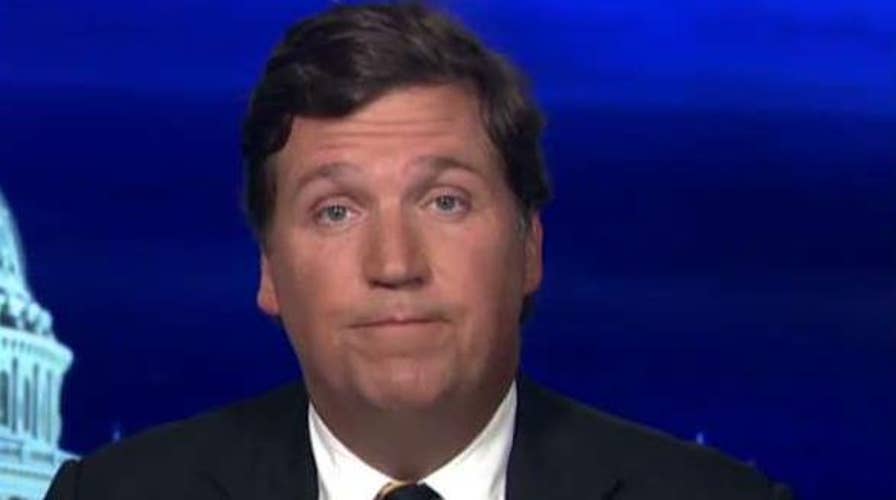Tucker: Bail reform making New York less safe
Pre-trial detention and cash bail have been eliminated for almost all misdemeanors and non-violent felonies.
New York City appears to be doing everything that it can to create more Grafton Thomases. On New Year's Day new bail laws went into effect in New York State. Those aren't going to help.
Pretrial detention and cash bail have now been eliminated for almost all misdemeanor and nonviolent felony cases; even some violent felonies are included.
What does it mean? It means the crimes like burglary, stalking, petty assault, many drug offenses -- even some types of arson and robbery -- are no longer bail crimes.
NEW LAWS ON GUNS, PRIVACY, ELECTRIC CARS GO INTO EFFECT ACROSS US
In the words of Governor Andrew Cuomo himself, the guy behind this, 90 percent of criminal defendants will now be back on the street right after being arrested. Habitual offenders will find it even easier than ever to commit more crimes immediately after getting caught.
With no bail constraining them, there is no incentive to show up for court. So of course, many will simply disappear and re-offend. Who benefits from this? It's hard to see who benefits from it, except the people getting out of jail.
Last week, New York resident Tiffany Harris allegedly assaulted three Orthodox Jewish women in Brooklyn. Harris was arrested, charged and released. On Sunday, she was arrested and charged with another assault, and she was released again.
On New Year's Eve, guess what she did? She got arrested for a third time. This time she is finally being kept in custody. That's New York.
CLICK HERE TO GET THE OPINION NEWSLETTER
But Democratic presidential candidates have made it clear that if they take power in Washington this fall, they will make the rest of the country every bit as inviting for criminals.
Sen. Kamala Harris, D-Calif. and former 2020 presidential candidate: I have been a leader in the United States Senate on saying we need to get rid of the cash bail system.
Sen. Bernie Sanders, I-Vt., presidential candidate: They're in jail because they are too poor to afford cash bail. You understand what I'm saying? We're going to end cash bail.
Sen. Kirsten Gillibrand, D-N.Y.. former presidential candidate: We should get rid of cash bail entirely.
Sen. Elizabeth Warren, D-Mass., presidential candidate: How about we stop making poverty a crime? No more cash bail. This is crazy.
Is this what the country wants or needs? Is this a peaceful place where law-abiding citizens feel safe and protected and ought to be?
Democratic presidential candidates have made it clear that if they take power in Washington this fall, they will make the rest of the country every bit as inviting for criminals
Increasingly it's not. For about half a decade, criminal justice reform has been one of the chief obsessions of our ruling class. Eliminating bail is just one prong of the offensive that they are waging. They're also demanding shorter prison sentences, fewer cops in "over-policed neighborhoods," whatever that is, voting rights for violent criminals in prison and more.
Now, often these policies enjoy support from guilt-ridden Republicans who have forgotten who they represent. The year 2019 just ended, and so now we can bring some data to this conversation and fully assess the human toll of these policies.
We have the numbers. Here's what they are: In Philadelphia, a city we've taken a close look at on this show, under the direction of Soros-funded DA Larry Krasner, the city recorded 359 murders for the year. That's the most in more than a decade.
More from Opinion
In other words, people died as a result of these policies -- more than a hundred -- and it's not just in Philadelphia. Baltimore had 348 murders last year. That's the most since 1993, and at a per capita level, it's the deadliest year on record in Baltimore.
In 2014, Dallas had only 116 homicides; in 2019, after the far-left district attorney, John Creuzot, promised not to prosecute thefts valued at less than $750, the murder rate went up to over 200. In Charlotte, North Carolina, 57 homicides were recorded in 2018 -- 57. In 2019, Charlotte reached that number before the end of June and then just kept going. The city finished with 108 murders on the year -- that's the most since the early 1990s.
How about Washington, the nation's capital? Well, in 2012, D.C. had just 88 murders. Even two years ago, there were only 116. But in 2019, there were 166 murders.
See a trend? You should because it's everywhere. We could spend half the show resetting the stats for city after city -- St. Louis, Raleigh, Seattle, Louisville, Cincinnati -- we could go on and on. The point is across the country, in city after city, murder rates have surged dramatically compared with just five years ago. This is happening. These are not fake statistics. They're the most real.
And even in cities where violent crime hasn't surged, locals are dealing instead with property crimes and quality of life offenses, which are significant. In some places, it's severe.
San Francisco, for example, is facing an epidemic of shoplifting and car robberies. It has made life unbearable for many taxpayers. We've got a series on that running next week, which you won't want to miss.
CLICK HERE TO GET THE FOX NEWS APP
The bottom line is normal people don't want criminal justice reform; they want criminal justice enforcement. They've always wanted that. So why aren't they getting it?
Adapted from Tucker Carlson's monologue from "Tucker Carlson Tonight" on Jan. 2, 2020.

